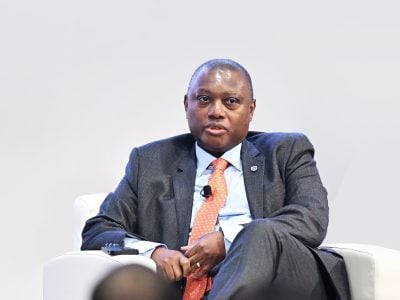The law creating the Central Bank of Nigeria envisaged a financial system regulator that is independent and insulated from politics. But current Governor Godwin Emefiele had other ideas.
He not only dreamed of succeeding President Muhammadu Buhari, whose second term in office ends next May, he also took steps to make it a reality.
Emefiele attempts to join presidential race
Speculation about Emefiele’s intentions first arose when non-governmental organisations went on street marches last year to call on him to contest presidential elections due in February 2023.
Though designed to be spontaneous eruptions of pro-Emefiele political fervour, some Nigerians saw them as a bid by Emefiele to test the waters before joining a race.
The mask fell off when his supporters went ahead to procure a nomination form for him after Abdullahi Adamu, chairman of the ruling All Progressives Congress, confirmed that the central bank head had registered as a party member last year.
Emefiele went a step further to confirm what was long suspected when he filed a lawsuit asking a court to permit him to remain in office while pursuing his presidential ambition. His plans were effectively scuppered when the court declined to accede to his demand.
For many the damage was already done. At a time when a combination of devaluation and inflation was rapidly eating up the value of the naira, the national currency, critics say Emefiele’s political ambitions create further uncertainty about the direction of monetary policy. Not a few critics have since then called for him to resign or be fired.
The Independent National Electoral Commission, in charge of elections in Nigeria, expressed concern that it might be forced to end the use of the central bank’s vaults to store sensitive election materials if the governor were to undertake partisan political campaigns while on the job.
A political banker
With his dramatic moves, Emefiele has confirmed his place as the most political central bank governor of recent memory in Nigeria. Appointed by Buhari’s predecessor, Goodluck Jonathan in 2014, Emefiele has aligned his decision-making to the whims of the political authorities more than any other governor since the end of military rule in 1999.
Not long after Buhari first took office in 2015, Nigeria was suddenly confronted with economic difficulties as the price of crude oil, its main export, plunged from the peaks it reached a year earlier to record lows. The naira exchange rate came under pressure because of the country’s dependence on imports.
Having promised during his electoral campaigns to make the naira equivalent to the dollar in value, Buhari was reluctant to allow devaluation of the national currency.
Emefiele obliged him and chose to suppress demand instead, banning a long list of imports and creating a multiple exchange-rate system that allowed certain businesses to obtain foreign exchange at lower rates, and others at higher rates.
The multiple-rate system ultimately became a conduit for political patronage. In the unofficial, parallel exchange market that provided a more accurate gauge of foreign-currency demand, the naira’s value plummeted. As inflation shot up and productivity dipped, Nigeria experienced its first recession in 25 years.
Amid several capital control measures, foreign portfolio investors headed for the exit and a large number are yet to return. Under World Bank and International Monetary Fund pressure to abolish the multiple-rate system, the central bank created a window for direct foreign-exchange trading between importers and exporters. That has since been adopted as the official exchange rate.
Emefiele’s policies endeared him to Buhari, who eventually nominated Emefiele to a second term, making him the first head of the central bank to serve two terms in more than three decades.
A more interventionist central bank
The central bank has become more interventionist under Emefiele. The financial system regulator introduced projects and programmes to channel funds to agriculture and manufacturing aimed at local production and import substitution. It has also funded the government extensively through ways and means financing.
“Part of the consequences is that on economic matters, Emefiele overshadows even the finance minister,” says Sochi Obi, an Abuja-based economist. “That may have convinced him that he has a larger than life importance enough to consider himself worthy of succeeding Buhari.”
Emefiele studied banking and finance for his graduate and postgraduate degrees at the University of Nigeria in the 1980s. He started his working life as a university teacher before joining the then startup Zenith Bank in 1990. He rose steadily in the bank, eventually succeeding the founder, Jim Ovia, as chief executive officer in 2010. Emefiele was tapped for the central bank role four years later.
Calls for Emefiele to resign grow louder
Following his political adventure, which many feel has undermined the independence of the central bank, a growing chorus of voices have been calling for him to quit.
“The partisan disposition of Emefiele has cast a dark cloud over the credibility, independence, neutrality and professionalism of the Central Bank of Nigeria,” said a statement from Muda Yusuf, chief executive officer of Lagos-based think tank, Centre for the Promotion of Private Enterprise.
“It is a troubling development because of the huge reputational risk to and the wider implications for the Nigerian economy. In the circumstances, the most respectable course of action for the Central Bank governor is to resign.”
So far Emefiele, hasn’t resigned and neither has Buhari shown any inclination to cut short the governor’s current tenure, which is due to end in 2024. Buhari’s reluctance to criticise Emefiele has prompted speculation that the central bank governor’s political moves may be choreographed with the government.
The Leadership and Accountability Initiative, a Nigerian non-governmental organisation, said it intends to force Buhari’s hand by filing a law suit to seek to compel him to remove Emefiele. The group argues that he’s no longer fit for the office he occupies “having registered as a member of a political party”.
Even if Buhari ignores the pressure and keeps Emefiele, it’s unlikely a new president will be comfortable with the political liability the central bank governor has become.
Want to continue reading? Subscribe today.
You've read all your free articles for this month! Subscribe now to enjoy full access to our content.
Digital Monthly
£8.00 / month
Receive full unlimited access to our articles, opinions, podcasts and more.
Digital Yearly
£70.00 / year
Our best value offer - save £26 and gain access to all of our digital content for an entire year!
 Sign in with Google
Sign in with Google 



